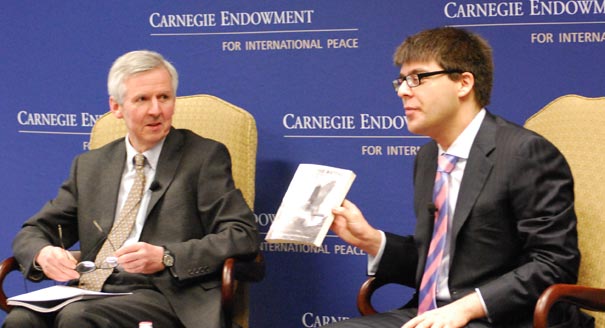Registration
You will receive an email confirming your registration.
IMGXYZ3646IMGZYXA referendum on Scottish independence scheduled for autumn 2014 could have profound ramifications for the United Kingdom's nuclear deterrent and hence for U.S.-U.K. relations. The United Kingdom’s entire nuclear force, made up of Trident missiles on Vanguard-class submarines, is operated out of two bases in Scotland. In the absence of a suitable option for re-basing the submarines in England or Wales, the United Kingdom's Royal Navy must consider a range of alternatives—including disarmament.
William Walker, co-author of Uncharted Waters: the UK, Nuclear Weapons and the Scottish Question, discussed the implications of the 2014 referendum on the U.K. nuclear deterrent. Carnegie’s James Acton moderated.
Historical Background
- The United Kingdom and Scotland: Scotland has a long history of maintaining a separate identity from the greater United Kingdom, Walker said. Scotland’s allegiance to the United Kingdom weakened most notably in the 20th century, especially during the administration of Margaret Thatcher from 1979 to 1991. A 1997 referendum gave decisive support to devolution and established the Scottish Parliament and Executive.
- British Nuclear Background: Walker explained that the U.K. nuclear deterrent was born in the spirit of close cooperation with the United States and remains an integral part of the U.S.-U.K special relationship. Since 1998, the U.K. nuclear arsenal has operated entirely from Western Scotland. Britain’s four Vanguard-class submarines with Trident missiles are the only U.K. nuclear delivery system, and birthed at Faslane naval base. Missiles and warheads are stored nearby at the Coulport depot. As such, the implementation of Britain’s nuclear weapons policy requires close cooperation between London and Edinburgh.
Scottish Independence
- Scottish National Party (SNP): In the 2011 election, the SNP—a social democratic political party—won a landslide victory and formed a majority government in the Scottish Parliament. The SNP government intends to hold a referendum by the Scottish electorate on the issue of independence from the United Kingdom in 2014, Walker explained.
- SNP and Nuclear Disarmament: The SNP has long opposed the stationing of nuclear weapons in Scotland, Walker said. Their manifesto reads, “Our opposition to the Trident nuclear missile system and its planned replacement remains firm—there is no place for these weapons in Scotland.” The SNP has vowed to bring an independent Scotland into the Nuclear Nonproliferation Treaty (NPT) as a non-nuclear weapon state.
- The U.K Nuclear Deterrent: The SNP’s position therefore challenges the fate of the U.K nuclear arsenal should Scotland become an independent sovereign state following the 2014 referendum, Walker said. A decisive referendum would severely complicate the United Kingdom’s maintenance of an independent nuclear deterrent.
The Future of British Nuclear Weapons
- Few Alternative Sites: A common response to the Scottish nuclear question has been to assert that the submarines, missiles and warheads could be based elsewhere. However, relocating the Coulport armaments depot, in particular, to existing naval bases in England (the most plausible alternative) is not feasible due to logistical, financial, and political issues, Walker said.
- Credibility of Disarmament Commitment: Walker contended that even if Scotland achieves independence, it is not clear that the newly established government would prioritize the nuclear issue, especially if key states from which it was seeking recognition—the United States in particular—pressured it to host UK nuclear weapons on its territory. In fact, Trident could serve as a very useful bargaining chip for Scotland in independence negotiations, Walker contended.
- Operational Issues: One possibility would be for an independent Scotland to agree to host UK nuclear weapons on its territory under British control, Walker said. He noted, however, that it would be unprecedented for a nuclear weapon state’s entire arsenal to be based outside its own borders.
- General Issue of Disarmament: Alongside the debate surrounding Scottish independence is the issue of whether the United Kingdom can or should maintain nuclear forces. During a time of austerity, Walker explained that many in London have called the sustainability and necessity of Trident into question. Therefore, regardless of what Scotland decides in 2014, the fate of Trident is uncertain.
Considerations and Critical Questions
Walker concluded with several pertinent questions about the implications of Scottish independence and the U.K. arsenal for other international actors. These included:
- Does the United States care about the United Kingdom maintaining its own nuclear deterrent?
- What would be the implications of Scottish independence for NATO and Europe?
- Would disarmament affect the U.K’s position on the United Nations Security Council?
- What may be the future implications for the NPT and the ongoing disarmament debate among signatories?
